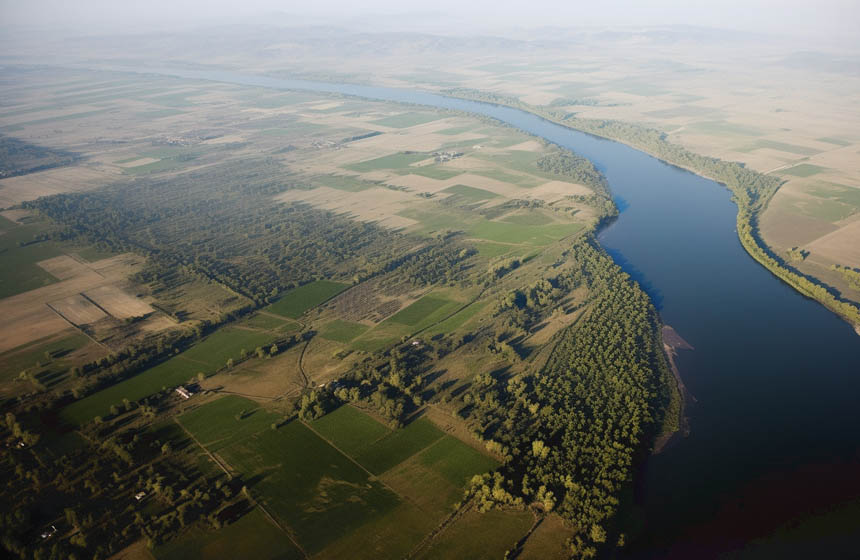Integrated water resource management to preserve water quality and prevent sedimentation
The Lukaya River Basin is an important source of drinking water for the Democratic Republic of the Congo (DRC), but heavy sedimentation has jeopardized its flows leading to community-led forestry programs to reduce erosion.
Nature-based Intervention:
Large scale deforestation had left the Lukaya River Basin vulnerable to flooding and erosion. In order to counteract this trend 4 tree nurseries were established which are capable of producing 42,000 seedlings each year. A community agroforestry system was created covering 15 ha( 7 ha of which reforested slopes) and benefitting 20 local families. Green buffer zones were established along the riverbank in order to reduce sedimentation and erosion. Bioengineering utilizing the plant vetiver(Chrysopogon zizanioides) was implemented in order to to reduce the rates of erosion in gully’s and riverbanks. Four nurseries were created with the ability to produce 32,000 vetiver plants per year. Workshops were held to teach the community about ecosystem based disaster risk reduction (Eco-DRR) and how to implement it.
Overview of context and outcomes:
The Lukaya river basin is an important water source for the country’s capital Kinshasa. The erosion in the river causes sedimentation which in turn reduces reduces water quality, blocks the flow of the river, decreases the quality of local fisheries and increases the cost of water treatment.
Case effectiveness on
Climate change
While no mitigation outcome was reported, reforestation efforts likely sequestered greenhouse gasses.
The project reportedly was able to stabilize steep slopes and plant green walls around houses to help limit the risks presented by flooding. Vetiver plantings along the banks and gully’s were reportedly used to stabilize soil and reduce erosion. Workshops and plant nurseries reportedly allowed for the dissemination of Eco-DRR practices.
Ecosystem health
Ecological effect: PositiveThe project reported a substantial improvement in water quality within the river-basin. The reported decrease in sedimentation within the river allowed for improvements in habitat quality for aquatic species and reforestation along the river’s edge and surrounded slopes allowed for an expansion of habitat extent.
Socioeconomic outcomes
The improved water quality reportedly decreased the cost of running the water treatment plant on the level and increased local water security. The poor water quality was also reportedly having a negative impact on local fisheries, which have likley benefitted from this improvement. The agroforestry project implemented helps support the livelihoods of 20 households with 40% of the farmers involved being women.
Governance
An Integrated Water Resources Management strategy plan for the basin was designed by local communities through a participatory process and then verified by the central government. The implementation of the plan was done in collaboration between the DRC Government, the Lukaya River Users Association, the public water utility (REGIDESO), local communities, and the University of Kinshasa.
Finance
The project received $310,000 in funding from the European Commission and $390,000 in funding from the UN Development Account.
Monitoring and evaluation
Local risk monitoring systems have been established to evaluate the risks posed by erosion and possible floods.
Trade-offs and limitations
No information yet available on tradeoffs.

Intervention type
- Restoration
Conducted at landscape scale
Ecosystem type
- Streams, rivers, riparian
Climate change impacts addressed
- Freshwater flooding
- Soil erosion
Instigators
- Community/self driven
- Local private sector
- National government/agency
Societal challenges
- Biodiversity conservation
- Climate change adaptation
- Disaster risk reduction
- Economic and Social development
- Food security
- Water security
Outcomes
- Food security: Positive
- Water security: Positive
- Health: Not reported
- Local economics: Positive
- Livelihoods/goods/basic needs: Not reported
- Energy security: Not reported
- Disaster risk reduction: Positive
- Rights/empowerment/equality: Not reported
- Conflict and security: Positive
- No. developmental outcomes reported: 5
Resources
Read resource 1Read resource 2
Literature info
- Grey literature
- Peer reviewed



